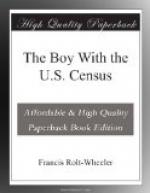“I’m Hamilton Noble,” the boy answered in return, “and I’ve just got through taking the census for this district. I’ve got all the names in here,” he added, tapping his portfolio, “and now I’m going to the supervisor’s office to turn in my reports.”
“I am afraid your census will be incomplete,” said ‘Windy,’ “for, so far as I am aware, the rolls of the United States will be lacking the names and distinction of this gallant little company.”
“Haven’t you been listed?” asked Hamilton, glad that the subject should have seemed to come up in so natural a way and mentally congratulating himself on the success of his device to secure the friendship of the crowd.
“Nary a list,” said ‘Hatchet Ben,’ “the rustlers of the Ringling Circus told us that they had been enumerated four times, once for every week they played, an’ that not a blessed one of the census men would believe they had been taken before; but they cut us out entire.”
“Well, I guess I had better take you right now,” said Hamilton. “I’ve room on the census sheet for a few more names.”
“You can count me out,” said ‘Hatchet Ben,’ “I’m not lookin’ for that kind of fame.”
“Don’t you think it’s fair to the country to let it know who you are?”
“What’s the census to me?” the other said defiantly. “I calc’late a country that doesn’t give a fellow a livin’ doesn’t care much about his name.”
“But you’re getting a living, just the same,” answered Hamilton, “and you’re an American, anyhow, aren’t you?”
“New York State,” the tramp replied.
“And you?” asked Hamilton, turning to the orator of the party.
“I’m an Oxford man,” answered the ‘Windy Duke,’ “classical tripos—if you know what that means.”
“I do,” answered Hamilton, “but why—” and he stopped.
“You were going to ask me why I prefer to wander afield rather than be ‘cribbed and confined’ within narrow walls. I am but one of many, an educated man without any knowledge of how to use his learning. Do you care for Greek? There are some clever scenes from Aristophanes that I can give you, or if you have a taste for satire I yield second place to none in my interpretation of Juvenal. On the pre-Cadmean alphabets I am—in my humble way—quite an authority. But these magnificent talents,” he added with a self-depreciatory smile, “do not enable me to run a business as successfully as a Greek fruit peddler or a Russian Jew vender of old clothes.”
“You could teach,” suggested Hamilton.
“Only my friends,” replied the scholar. “To teach requires pedagogy and numerous devices for improving the youthful mind. I do not greatly admire the youthful mind and it bores me. I am informed that I also bore it. Hence I prefer rather to wander than to teach. I do not claim originality in this role; there have been ‘scholar gypsies’ before this. The phrase sounds better than ‘educated hobo,’ but the meaning is the same.”




